Overview
- Brief Narrative
- Blue and gray striped prisoner uniform cap worn by Ber (later Beryl) Miklin in Stutthof concentration camp from the fall of 1944 to early 1945. Ber, his wife, parents, two sisters, and two brothers were forced into the Riga ghetto in Latvia in September 1941 by the German occupying forces. Ber’s mother and wife died, and his youngest brother fled to Tashkent, Uzbekistan. Ber and his elder brother were transported to the Riga-Kaiserwald concentration camp in August 1943, and were assigned to forced labor. Ber’s father, sisters, and his sisters’ families were also sent to Kaiserwald, but later killed. The camp was evacuated in the summer of 1944, and most of the prisoners were deported to Stutthof concentration camp in German-occupied Poland. Ber and his brother David were in Stutthof for about six months, and David likely died during this time. On January 25, 1945, the SS began evacuating Stutthof, and Ber was among the prisoners sent on a death march. Ber escaped the march, and hid in the nearby forest. He traveled to Poznań, where local farmers allowed him to work in exchange for food. After the war, Ber moved multiple times before landing in the displaced persons (DP) camps near Munich. In the Neu Freimann DP camp, Ber met and married fellow-survivor Mirka (later Marian) Kestenberg. They had their first son in 1947, and immigrated to the United States in the fall of 1949. After a year in El Paso, Texas, the family relocated to Denver, Colorado, and had two more children.
- Date
-
use:
approximately 1944 October-1945 February
- Geography
-
use:
Stutthof (Concentration camp);
Sztutowo (Poland)
- Credit Line
- United States Holocaust Memorial Museum Collection, Gift of Marian Miklin
- Contributor
-
Subject:
Beryl I. Miklin
- Biography
-
Ber Itzhak Miklin (later Berl/Beryl, 1915-1998) was born in Rēzekne, Latvia, to Motel (Mordechai, 1873-1943) and Gitel Miklin (nee Serebro, 1880-1941). Ber had two sisters, Lena (or Lea/Leja, later Buschkin, 1905-1943) and Zipa (later Fogel, 1908-1943), and two brothers, David (1911-1945) and Phillip (or Faivušs, 1918-1945). Jews made up about a quarter of Rēzekne’s population, and Ber attended a Jewish day school and acquired Zionist beliefs. He did not keep Kosher and only went to the synagogue on occasion. He experienced some antisemitism, but it did not affect his life in a major way. Motel worked as a tailor, and began teaching Ber the trade at a young age. The family was poor, so in 1928, at age 13, Ber moved 150 miles to Riga to find work. He found a job as a tailor’s apprentice, and sent money home to his family when he could. He also returned to see his family periodically.
Ber married Mera Kaplan (1918-?) and served in the Latvian military from 1939 to 1941. In August 1940, the Soviet Union annexed Latvia, which became the Latvian SSR. Around this time, the Soviets transported Ber’s family to Riga. In June 1941, Germany invaded the Soviet Union, and entered Riga on July 1. In August, the German authorities began developing for a closed ghetto in Riga, where Ber’s family was forced to move in September. In November and December, two Aktions conducted by the German Order Police resulted in the deaths of 25,000 Latvian Jews in the ghetto, which was then repopulated with Jews deported from other countries. Ber and his family were among those deemed healthy enough to work, and were moved to a separate area of the ghetto. Most of the Jews assigned to forced labor worked at sites outside of the ghetto. One sister worked as a seamstress, the other worked in a shoe factory. His brother David also worked in a shoe factory while Phillip was able to attend an international school outside of the ghetto. Life in the ghetto was very hard, and Ber’s mother, Gitel, died in 1941. Phillip fled to Tashkent, Uzbekistan, in 1942, where he likely died.
The Riga-Kaiserwald camp was established in March 1943 at the Mežaparks Forest, north of the central city. That summer, the German Security Police began transferring the Riga Jews to the administration of Kaiserwald concentration camp, which had 23 forced-labor subcamps. Ber and David were transported to Kaiserwald in August, and were assigned to work as electricians. Ber’s father, sisters, and his sisters’ families, were also sent to Kaiserwald, but later killed.
German authorities began evacuating Kaiserwald in the summer of 1944, ahead of the impending Soviet army. Most of the prisoners were marched to Riga’s port, where they were put on ships to Danzig in German-occupied Poland, and force-marched again on their way to Stutthof concentration camp. Ber and David were in Stutthof for about six months; David likely died during this time. On January 25, 1945, the SS began evacuating Stutthof, forcing about half of the 23,000 prisoners on a march to Neuengamme. Ber managed to escape the march, and hid in the nearby forest. He made his way to the area of Poznań, Poland, where some of the local farmers allowed him to work in exchange for food.
The area around Poznań was liberated by Soviet Forces in February, who hired Ber for a time. He then traveled to Lodz, where he stayed for half a year. Ber eventually made his way to Landsberg displaced persons (DP) camp near Munich, in the American zone of Germany, and later moved to the nearby Neu Freimann DP camp. While in the DP camps, Ber took tailoring and patternmaking courses through ORT (Obshchestvo remeslennogo i zemledelʹcheskogo truda sredi evreev, or Organization for Rehabilitation through Training). ORT was established in Russia in 1880, and following World War II, provided training courses to survivors to help them rebuild their lives in new countries. In Neu Freimann, Ber met Mirka Kestenberg (1925-?). Born in Slupia Nowa (now Nowa Slupia), Poland, Mirka and her two sisters were forced to work at an ammunitions factory in the fall of 1942. They were sent to Auschwitz-Birkenau, Magdeburg, and Mauthausen, before they escaped by jumping off a transport train in February 1945. They worked for local farmers near Prague, Czechoslovakia, until the end of the war in May 1945. After multiple relocations, the sisters ended up at the DP camps near Munich. Ber and Mirka married at Neu Freimann in September 1946, and made plans to immigrate to Palestine. When their first son, Joszua, was born in 1947, they decided to immigrate to North America instead. The family left Germany on October 31, 1949, and sailed to the United States, where they changed their names to Beryl, Marian, and Mark. They initially settled in El Paso, Texas, but a lack of tailoring work for Beryl led them to move to Denver, Colorado. Beryl found work in a department store, and later opened his own tailoring shop. The couple had two more children, Jerry and Lorraine.
Physical Details
- Classification
-
Clothing and Dress
- Category
-
Concentration camp uniforms
- Object Type
-
Caps (Headgear) (lcsh)
- Genre/Form
- Prison uniforms.
- Physical Description
- Blue and gray striped, mediumweight, twill weave cloth cap. The blue stripes are printed on the gray cloth, and the seams are machine stitched in black thread. The crown is flat and circular. The sides are formed from four rectangular panels sewn into a band and attached to the edge of the crown to give the cap height and shape. The side panels are made from a plain weave gray cloth, with vertically oriented, dark blue printed stripes. A headband, made from the same cloth as the crown, has been stitched along the bottom edge of the side panels, with the stripes oriented horizontally. The interior is lined with an olive green, satin weave cloth that has been machine sewn, except for a four-inch long section of the seam between the headband and side panel, which has raw edges and is sewn closed (or repaired) with light blue stitching. The interior lining has a couple of small holes and a faint blue ink stain in the center. On the exterior, there are a couple small reddish-brown stains and the blue stripes are partially worn off.
- Dimensions
- overall: Height: 3.000 inches (7.62 cm) | Width: 7.500 inches (19.05 cm) | Depth: 7.500 inches (19.05 cm)
- Materials
- overall : cloth, thread, ink
Rights & Restrictions
- Conditions on Access
- No restrictions on access
- Conditions on Use
- No restrictions on use
Keywords & Subjects
- Topical Term
- Concentration camp inmates--Poland--Biography. Death marches. Death march survivors. Escapes. Forced labor--Latvia. Holocaust, Jewish (1939-1945)--Latvia. Holocaust survivors--Marriage. Jewish ghettos--Latvia--Rīga. Jews--Vocational education. Latvia--History--German occupation, 1941-1944. Latvia--History--Soviet occupation, 1940-1941. Tailoring--Vocational guidance.
Administrative Notes
- Legal Status
- Permanent Collection
- Provenance
- The cap was donated to the United States Holocaust Memorial Museum in 2003 by Marian Miklin, the wife of Beryl Miklin.
- Funding Note
- The cataloging of this artifact has been supported by a grant from the Conference on Jewish Material Claims Against Germany.
- Record last modified:
- 2023-08-28 09:14:26
- This page:
- https://collections.ushmm.org/search/catalog/irn513163
Download & Licensing
In-Person Research
- By Appointment
- Request 21 Days in Advance of Visit
- Plan a Research Visit
- Request to See This Object
Contact Us
Also in Beryl and Marian Miklin collection
The collection consists of a blanket, a concentration camp uniform cap, four greeting cards, two pattern books, and photographs relating to the experiences of Beryl Miklin in Stutthof concentration camp in Poland during the Holocaust, and to the experiences of Beryl and Marian Miklin in Neu Freimann displaced persons camp in Germany after the Holocaust.
Date: 1944-1947
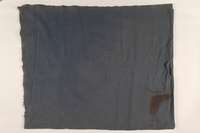
Wool blanket found by a Jewish Latvian concentration camp prisoner after escaping a death march
Object
One of two wool blankets found by Ber (later Beryl) Miklin, and used during and after a death march from Stutthof concentration camp in January 1945. Originally green, Ber dyed this blanket blue and used the other to make a pair of pants. Ber, his wife, parents, two sisters, and two brothers were forced into the Riga ghetto in Latvia in September 1941 by the German occupying forces. Ber’s mother and wife died, and his youngest brother fled to Tashkent, Uzbekistan. Ber and his elder brother were transported to the Riga-Kaiserwald concentration camp in August 1943, and were assigned to forced labor. Ber’s father, sisters, and his sisters’ families were also sent to Kaiserwald, but later killed. The camp was evacuated in the summer of 1944, and most of the prisoners were deported to Stutthof concentration camp in German-occupied Poland. Ber and his brother David were in Stutthof for about six months, and David likely died during this time. On January 25, 1945, the SS began evacuating Stutthof, and Ber was among the prisoners sent on a death march. Ber escaped the march, and hid in the nearby forest. He traveled to Poznań, where local farmers allowed him to work in exchange for food. After the war, Ber moved multiple times before landing in the displaced persons (DP) camps near Munich. In the Neu Freimann DP camp, Ber met and married fellow-survivor Mirka (later Marian) Kestenberg. They had their first son in 1947, and immigrated to the United States in the fall of 1949. After a year in El Paso, Texas, the family relocated to Denver, Colorado, and had two more children.
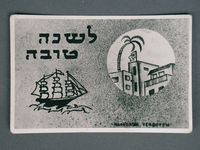
Rosh Hashanah card with a sailing ship received by newlyweds in Neu Freimann dp camp
Object
Shana Tova (New Year's) card received by Ber and Mirka Miklin at Rosh Hashanah while they were living Neu Freimann displaced persons camp in Germany. The card has an image of a sailing ship and a building with palm tree. Ber and Mirka married in the DP camp on September 14, 1946. Rosh Hashanah was on September 26. Ber was from Latvia which was annexed by the Soviet Union in June 1940. The German invasion of the Soviet Union in June 1941 deployed mobile killing units which, assisted by Latvian and Lithuanian auxiliaries, slaughtered nearly all Latvian Jews. Those with skills useful to the Germans were put in work camps. Ber and his family were tailors and shoemakers, and they were imprisoned in the Jewish ghetto in Riga. In summer 1943, his father and two married sisters were sent to nearby Kaiserwald concentration camp and killed. Ber and his brothers Philip and Dawid were sent to Stuffhof where his brothers perished. Ber was transferred to Burggraben and then Lauenburg subcamp. He escaped when it was evacuated in January 1945 by death march. The war ended in May 1945 and Ber left Soviet controlled Warsaw for Germany. Mirka Kestenberg was from Nowa Slupia, Poland. She was sent to Starochowice labor camp with her two sisters in October 1942. In December 1944, she was transported to Auschwitz-Birkenau. In February 1945, she escaped during a train transport to Mauthausen. Both her sisters survived, but the rest of her family were killed in Auschwitz and Treblinka. Ber, Mirka, and their two year old son left for America in November 1949.
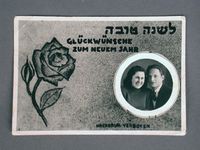
Rosh Hashanah card with a photo of a young couple received by a Jewish couple in Neu Freimann dp camp
Object
Shana Tova (New Year's) card received by Ber and Mirka Miklin in 1947 from Ber's friend Zsi Nisan and his wife while they were living in Neu Freimann displaced persons camp in Germany. The card has a photograph of a young, smiling couple. Ber and Mirka married in the DP camp on September 14, 1946. Ber and his family lived in Latvia which was annexed by the Soviet Union in June 1940. After the German invasion of Latvia in June 1941, Ber and his family were imprisoned in the Jewish ghetto in Riga. In summer 1943, his father Motel and two married sisters, Lena and Zippora, were sent to nearby Kaiserwald concentration camp and killed. Ber and his brothers Philip and Dawid were sent to Stuffhof where his brothers perished. Ber was transferred to Burggraben and then Lauenburg subcamp. He escaped when it was evacuated in January 1945 by death march. The war ended in May 1945 and Ber left Soviet controlled Warsaw for Germany. He settled in Neu Freimann displaced persons camp where he married 20 year old Mirka Kestenberg in September 1946. Mirka was deported from Nowa Slupia, Poland, to Starochowice labor camp with her two sisters in October 1942. In December 1944, she was transported to Auschwitz-Birkenau. In February 1945, she escaped during a train transport to Mauthausen. Both her sisters survived, but the rest of her family were killed in Auschwitz and Treblinka. Ber, Mirka, and their two year old son left for America in November 1949.
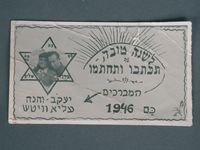
Rosh Hashanah card with their photo made by newlyweds in Neu Freimann dp camp
Object
Shana Tova (New Year's) card with their photo made by Ber and Mirka Miklin in 1946 while they were living in Neu Freimann displaced persons camp in Germany. Ber and Mirka married in the DP camp on September 14, 1946. Rosh Hashanah was on September 26. Ber and his family lived in Latvia which was annexed by the Soviet Union in June 1940. After the German invasion of Latvia in June 1941, Ber and his family were imprisoned in the Jewish ghetto in Riga. In summer 1943, his father Motel and two married sisters, Lena and Zippora, were sent to nearby Kaiserwald concentration camp and killed. Ber and his brothers Philip and Dawid were sent to Stuffhof where his brothers perished. Ber was transferred to Burggraben and then Lauenburg subcamp. He escaped when it was evacuated in January 1945 by death march. The war ended in May 1945 and Ber left Soviet controlled Warsaw for Germany. He settled in Neu Freimann displaced persons camp where he married 20 year old Mirka Kestenberg in September 1946. Mirka was deported from Nowa Slupia, Poland, to Starochowice labor camp with her two sisters in October 1942. In December 1944, she was transported to Auschwitz-Birkenau. In February 1945, she escaped during a train transport to Mauthausen. Both her sisters survived, but the rest of her family were killed in Auschwitz and Treblinka. Ber, Mirka, and their two year old son left for America in November 1949.
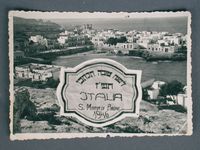
Rosh Hashanah card with a photo of an Italian seaport received by newlyweds in Neu Freimann dp camp
Object
New Year's card received by Ber and Mirka Miklin in 1946 while they were living in Neu Freimann displaced persons camp in Germany. The card is from Mirka's sister Syma and her husband Heniek Gutsztejn and has an image of the seaside village, S. Maria di Bagni. Sima and Heniek, both concnetration camp survivors, had met and married in Janaury 1946 in a DP camp in Italy. Ber and Mirka met and married in the DP camp on September 14, 1946. Rosh Hashanah was on September 26. Ber and his family lived in Latvia which was annexed by the Soviet Union in June 1940. After the German invasion of Latvia in June 1941, Ber and his family were imprisoned in the Jewish ghetto in Riga. In summer 1943, his father Motel and two married sisters, Lena and Zippora, were sent to nearby Kaiserwald concentration camp and killed. Ber and his brothers Philip and Dawid were sent to Stuffhof where his brothers perished. Ber was transferred to Burggraben and then Lauenburg subcamp. He escaped when it was evacuated in January 1945 by death march. The war ended in May 1945 and Ber left Soviet controlled Warsaw for Germany. He settled in Neu Freimann displaced persons camp where he married 20 year old Mirka Kestenberg in September 1946. Mirka was deported from Nowa Slupia, Poland, to Starochowice labor camp with her two sisters in October 1942. In December 1944, she was transported to Auschwitz-Birkenau. In February 1945, she escaped during a train transport to Mauthausen. Both her sisters survived, but the rest of her family were killed in Auschwitz and Treblinka. Ber, Mirka, and their two year old son left for America in November 1949.
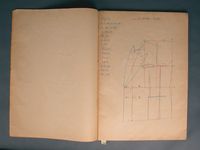
Workbook of clothing patterns drawn by a Jewish refugee for an ORT class
Object
Pattern book made by Ber Miklin during his tailoring course with the Organization for Rehabilitation through Training (ORT). He took the course in 1946-47 while living in Neu Freimann displaced persons camp in Germany with his wife, Mirka. Ber and his family lived in Latvia which was annexed by the Soviet Union in June 1940. After the German invasion of Latvia in June 1941, Ber and his family were imprisoned in the Jewish ghetto in Riga. In summer 1943, his father Motel and two married sisters, Lena and Zippora, were sent to nearby Kaiserwald concentration camp and killed. Ber and his brothers Philip and Dawid were sent to Stuffhof where his brothers perished. Ber was transferred to Burggraben and then Lauenburg subcamp. He escaped when it was evacuated in January 1945 by death march. The war ended in May 1945 and Ber left Soviet controlled Warsaw for Germany. He settled in Neu Freimann displaced persons camp where he married 20 year old Mirka Kestenberg in September 1946. Mirka was deported from Nowa Slupia, Poland, to Starochowice labor camp with her two sisters in October 1942. In December 1944, she was transported to Auschwitz-Birkenau. In February 1945, she escaped during a train transport to Mauthausen. Both her sisters survived, but the rest of her family were killed in Auschwitz and Treblinka. Ber, Mirka, and their two year old son left for America in November 1949.
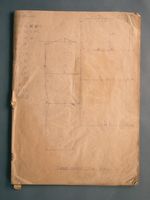
Workbook of clothing patterns drawn by a Jewish refugee for an ORT class
Object
Pattern book made by Ber Miklin during his tailoring course with the Organization for Rehabilitation through Training (ORT). He took the course while living in the Neu Freimann displaced persons camp in Germany with his wife, Mirka. Ber and his family lived in Latvia which was annexed by the Soviet Union in June 1940. After the German invasion of Latvia in June 1941, Ber and his family were imprisoned in the Jewish ghetto in Riga. In summer 1943, his father Motel and two married sisters, Lena and Zippora, were sent to nearby Kaiserwald concentration camp and killed. Ber and his brothers Philip and Dawid were sent to Stuffhof where his brothers perished. Ber was transferred to Burggraben and then Lauenburg subcamp. He escaped when it was evacuated in January 1945 by death march. The war ended in May 1945 and Ber left Soviet controlled Warsaw for Germany. He settled in Neu Freimann displaced persons camp where he married 20 year old Mirka Kestenberg in September 1946. Mirka was deported from Nowa Slupia, Poland, to Starochowice labor camp with her two sisters in October 1942. In December 1944, she was transported to Auschwitz-Birkenau. In February 1945, she escaped during a train transport to Mauthausen. Both her sisters survived, but the rest of her family were killed in Auschwitz and Treblinka. Ber, Mirka, and their two year old son left for America in November 1949.
Marian Miklin photograph collection
Document
The Marian Miklin collection consists of seven photographs depicting Beryl and Marian Miklin and their life in Neu Freiman displaced persons camp.



